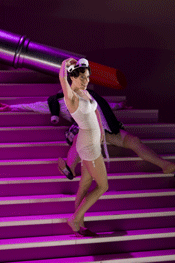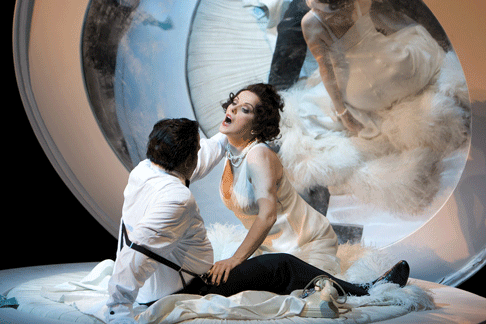Recently in Reviews
English Touring Opera are delighted to announce a season of lyric monodramas to tour nationally from October to December. The season features music for solo singer and piano by Argento, Britten, Tippett and Shostakovich with a bold and inventive approach to making opera during social distancing.
This tenth of ten Live from London concerts was in fact a recorded live performance from California. It was no less enjoyable for that, and it was also uplifting to learn that this wasn’t in fact the ‘last’ LfL event that we will be able to enjoy, courtesy of VOCES8 and their fellow vocal ensembles (more below …).
Ever since Wigmore Hall announced their superb series of autumn concerts, all streamed live and available free of charge, I’d been looking forward to this song recital by Ian Bostridge and Imogen Cooper.
The Sixteen continues its exploration of Henry Purcell’s Welcome Songs for Charles II. As with Robert King’s pioneering Purcell series begun over thirty years ago for Hyperion, Harry Christophers is recording two Welcome Songs per disc.
Although Stile Antico’s programme article for their Live from London recital introduced their selection from the many treasures of the English Renaissance in the context of the theological debates and upheavals of the Tudor and Elizabethan years, their performance was more evocative of private chamber music than of public liturgy.
In February this year, Albanian soprano Ermonela Jaho made a highly lauded debut recital at Wigmore Hall - a concert which both celebrated Opera Rara’s 50th anniversary and honoured the career of the Italian soprano Rosina Storchio (1872-1945), the star of verismo who created the title roles in Leoncavallo’s La bohème and Zazà, Mascagni’s Lodoletta and Puccini’s Madama Butterfly.
Evidently, face masks don’t stifle appreciative “Bravo!”s. And, reducing audience numbers doesn’t lower the volume of such acclamations. For, the audience at Wigmore Hall gave soprano Elizabeth Llewellyn and pianist Simon Lepper a greatly deserved warm reception and hearty response following this lunchtime recital of late-Romantic song.
Collapsology. Or, perhaps we should use the French word ‘Collapsologie’ because this is a transdisciplinary idea pretty much advocated by a series of French theorists - and apparently, mostly French theorists. It in essence focuses on the imminent collapse of modern society and all its layers - a series of escalating crises on a global scale: environmental, economic, geopolitical, governmental; the list is extensive.
For this week’s Live from London vocal recital we moved from the home of VOCES8, St Anne and St Agnes in the City of London, to Kings Place, where The Sixteen - who have been associate artists at the venue for some time - presented a programme of music and words bound together by the theme of ‘reflection’.
'Such is your divine Disposation that both you excellently understand, and royally entertaine the Exercise of Musicke.’
Amongst an avalanche of new Mahler recordings appearing at the moment (Das Lied von der Erde seems to be the most favoured, with three) this 1991 Mahler Second from the 2nd Kassel MahlerFest is one of the more interesting releases.
‘And there was war in heaven: Michael and his angels fought against the dragon; and the dragon fought and his angels, And prevailed not; neither was their place found any more in heaven … that old serpent … Satan, which deceiveth the whole world: he was cast out into the earth, and his angels were cast out with him.’
If there is one myth, it seems believed by some people today, that probably needs shattering it is that post-war recordings or performances of Wagner operas were always of exceptional quality. This 1949 Hamburg Tristan und Isolde is one of those recordings - though quite who is to blame for its many problems takes quite some unearthing.
There was never any doubt that the fifth of the twelve Met Stars Live in Concert broadcasts was going to be a palpably intense and vivid event, as well as a musically stunning and theatrically enervating experience.
‘Love’ was the theme for this Live from London performance by Apollo5. Given the complexity and diversity of that human emotion, and Apollo5’s reputation for versatility and diverse repertoire, ranging from Renaissance choral music to jazz, from contemporary classical works to popular song, it was no surprise that their programme spanned 500 years and several musical styles.
The Academy of St Martin in the Fields have titled their autumn series of eight concerts - which are taking place at 5pm and 7.30pm on two Saturdays each month at their home venue in Trafalgar Square, and being filmed for streaming the following Thursday - ‘re:connect’.
The London Symphony Orchestra opened their Autumn 2020 season with a homage to Oliver Knussen, who died at the age of 66 in July 2018. The programme traced a national musical lineage through the twentieth century, from Britten to Knussen, on to Mark-Anthony Turnage, and entwining the LSO and Rattle too.
With the Live from London digital vocal festival entering the second half of the series, the festival’s host, VOCES8, returned to their home at St Annes and St Agnes in the City of London to present a sequence of ‘Choral Dances’ - vocal music inspired by dance, embracing diverse genres from the Renaissance madrigal to swing jazz.
Just a few unison string wriggles from the opening of Mozart’s overture to Le nozze di Figaro are enough to make any opera-lover perch on the edge of their seat, in excited anticipation of the drama in music to come, so there could be no other curtain-raiser for this Gala Concert at the Royal Opera House, the latest instalment from ‘their House’ to ‘our houses’.
"Before the ending of the day, creator of all things, we pray that, with your accustomed mercy, you may watch over us."
Reviews
![Joan Rodgers as the Duchess [Photo by Bill Cooper courtesy of the Royal Opera House]](http://www.operatoday.com/%C2%A9BC20080607158-JOAN-RODGERS.gif)
28 Apr 2010
The Power of Powder: Thomas Adès at the Royal Opera House, London
Thomas Adès’s Powder Her Face is back at the Linbury Studio Theatre at the Royal Opera House. It's a classic. Once again, Joan Rodgers sings the Duchess, supported by Alan Ewing, Iain Paton and the incomparable Rebecca Bottone, all in multiple roles.
In 15 years, Powder Her Face has gone from new music cult hit to an opera of international significance. The Tempest notwithstanding, it’s Adès’s finest work. He’s gone on to fame, fortune and Los Angeles, but hasn’t quite recaptured the vitality of his early work. More recently, he’s revisited Powder Her Face, writing a suite based on it, so maybe that will reinvigorate his creative juices.
So cherish this wonderful production directed by Carlos Wagner. The production is every bit as much of a star as the Duchess of Argyll, who inspired the opera in the first place. In 1963, she appeared naked, but for a string of pearls, in photos which caused a scandal, because she was performing on naked men (one of whom was later revealed as Douglas Fairbanks Jr.)
“In your face” is probably an indelicate term to use in the circumstances, but it describes the magnificent staging well. There’s no way round the fact that the Duchess was destroyed by hypocrisy. In the small space of the Linbury Studio, Conor Murphy’s giant staircase overwhelms, but that’s the point: there’s no escape! It’s a brilliant piece of theatre in itself, because it changes character in each scene. In the end, Paul Keogan’s lighting turns it into a lurid neon sunset, the perfect coda to the Duchess’s life.
 Rebecca Bottone as Mistress
Rebecca Bottone as Mistress
The stairs also mean the cast can go up and down using the whole performance space, overcoming the cramped limitations of the small stage. Perhaps that’s a reverse metaphor for the Duchess, too. With her wealth and beauty she could have lived a charmed life, if she’d conformed. Instead she grabbed life greedily, imbibing to the full. The headless men in the notorious photos got away scot-free, as did the philandering, brutish Duke, but the Duchess’s reputation was destroyed. Defiant to the end, she cocoons herself away from a world that’s changing in ways she can’t understand (“Buggery, legal?” she exclaims.) Her end is sordid, but she keeps her dignity, at least in delusion. Larger than life personalities just don’t fit in grubby society.
The music’s remarkably inventive. Saxophones and jazzy clarinets evoke the glamour of 1930’s London. “They don’t know how to do parties now,” she wistfully tells a young reporter. Adès’ does luscious elegance, but undercuts it with sharp, dissonant edges. The luxury is illusion. Debutante balls were a meat market for the upper classes, nothing romantic. The Duchess buys sex from a waiter. “You can get anything with money,” she cries. But others have more money, and more power. The Courts condemn her, to the prurient delight of the “lower” class, represented by Bottone and Paton in dirty macs. And when the money runs out, the Duchess is evicted.
 Iain Paton as Waiter and Joan Rodgers as Duchess
Iain Paton as Waiter and Joan Rodgers as Duchess
Adès weaves elusive sounds into his orchestra. At the beginning of the second Act, he starts with solo accordion, played in a mysterious, bluesy fashion.. It makes an excellent bridge between past and present. Later, accordion, harp and piano (Adès’s instrument and “voice”) combine, wheezing, wailing and tensely staccato percussive blasts. It’s surreal, like hearing the ghosts of the past dancing in Hell. At the end, sinister cracks and whirrs are heard. They’re the sound of fishing rods being reeled in. Like a fish, the Duchess has been caught and dies.
The opera is both diamond hard and brittle, but then, that’s the subject. The Duchess wasn’t a nice person even though she was a product of the circles she moved in, and the men around her are worse. Her sexuality is compulsive, and fundamentally unerotic. (It’s the role, not Rodger’s portrayal, which is superb.) Perhaps the maid gets more fun. Bottone’s high-pitched shrieks at the top of her register (an Adès’ trademark) are well deployed. She’s the voice of anarchy. Her voice rips apart the silky surface of propriety.
Anne Ozorio
![Joan Rodgers as the Duchess [Photo by Bill Cooper courtesy of the Royal Opera House]](http://www.operatoday.com/%C2%A9BC20080607158-JOAN-RODGERS.gif)

